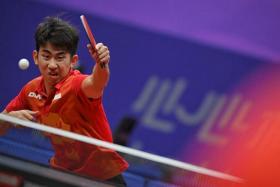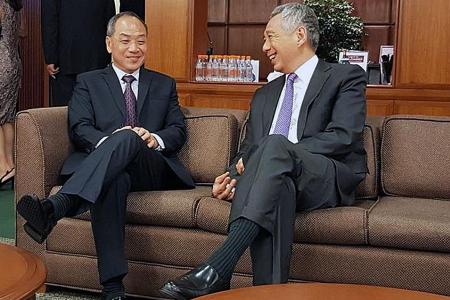PM Lee: S’pore must maintain social mobility
PM Lee says Education Ministry will work with schools such as RI to ensure they do not become 'self-perpetuating closed circles'
Despite its tradition of accepting students from diverse backgrounds, Raffles Institution (RI) is finding it harder to get students from different backgrounds, Education Minister Ong Ye Kung recently told Prime Minister Lee Hsien Loong.
Mr Ong said that despite the efforts of the school's new principal, Mr Frederick Yeo, to reach out to parents of promising students from primary schools across Singapore, some told him they were reluctant to send their children to RI not because of the demanding academic environment, but out of fear they would not fit in with more well-off students.
Mr Lee shared the anecdote in Parliament yesterday when he highlighted the importance of maintaining social mobility.
In reality, he said, RI students come from varied backgrounds, with more than half of its students living in public housing.
But perceptions of a lack of affordability and students feeling out of place discourages youngsters from applying to join RI. This is not good for the school or Singapore.
Mr Lee said the Ministry of Education will work with RI and other schools so they never become "self-perpetuating closed circles".
"Above all, our education system must stay open," he said.
The Government has set aside places in primary schools for children without affiliation, and it will do more if necessary.
"We give everyone a good education, and now we are investing heavily in pre-school, to give all Singaporean kids, in fact, almost babies as well, a good start in life," Mr Lee said.
Above all, our education system must stay open.Prime Minister Lee Hsien Loong
The Government is also expanding opportunities for students from different schools to interact, through sports, community activities and the Outward Bound School.
Mr Lee also talked about the controversy over an unauthorised social studies guidebook that made generalisations of the behaviour, tastes and speech patterns of people from high and low socio-economic statuses.
Singaporeans were appalled by this and rightly so, he said.
Every society has its elites who share similar backgrounds, interests and social spaces, Mr Lee noted, and such networks are natural and are important to Singapore's social capital.
But he warned that these elite groups must not close up and prevent outsiders from getting in.
Improving social mobility is a "wicked problem" faced by many societies, with no easy solutions and no magic bullets.
But with a strong social safety net, universal education, home ownership and the Government's determination to widen opportunities, Singapore's strategy to tackle inequality has been more successful than most.
"We want Singapore society to maintain an informal and egalitarian tone, where people interact freely and comfortably as equals, and there are no rigid class distinctions or barriers that keep good people down," Mr Lee said.
"This is important but beyond the Government's ability to bring about alone. Society itself has to be open and permeable. Each one of us must carry those attitudes, values, norms, that willingness to welcome talent and ability, and to keep the system the way it is."
Build links between different groups for social cohesion: PM Lee
The shared experiences of living in Housing Board towns and going through National Service have made Singaporeans more united now compared to 50 years ago, said Prime Minister Lee Hsien Loong yesterday.
But external forces that could exploit enduring fault lines like race, language and religion and pull Singaporeans in different directions have also grown stronger, he warned.
He stressed the need to build bridges between different groups to counteract such divisive forces.
Such efforts have to go beyond bridging race, language and religion, he said, calling for social cohesion to be strengthened between management and unions, and old citizens and new.
He noted that the ethnic, cultural and economic pulls of regional powers like China and India will continue to exert a force on Singaporeans.
On one hand, Singapore wants to maintain its separate identity as an independent, sovereign and multi-racial country, said PM Lee. But its relationship with China and India is complicated by ethnic links, cultural ties and its inside track to both nations.
"Between the two, there is tension, and we have to keep that balance and maintain our position and our cohesion," he said.
The situation is similar for Malay Singaporeans, he added. Despite the clear emergence of a Malay-Singaporean identity, it still overlaps with the Malays in Malaysia, both in terms of race and religion.
The call for a global Islamic ummah, or community, also has a "powerful appeal", he noted.
Singapore is also exposed to extremist and exclusivist teachings. In the event of a terrorist attack, it will sow great fear and distrust between Muslims and other Singaporeans, he said.
As for ties between other groups, he noted that in the new economy, there are fewer workers doing rank-and-file jobs traditionally covered by trade unions, with more workers becoming freelancers and professionals. If these new groups are left out, more workers will feel their needs are not taken care of and look for other solutions, he warned.
PARTNERSHIP
"It would weaken tripartism and our social compact," he said, noting that this three-way partnership is a vital element of Singapore's social cohesion. It is thus better for the labour movement to embrace them and adopt their concerns, he added.
Singapore also has to build a bridge between old citizens and new ones, he said, adding that it needs a steady flow of immigrants to top up its population.
PM Lee: WP plays a role in Singapore politics
Seated together on a sofa in Parliament House on Monday last week at the reopening of Parliament, Prime Minister Lee Hsien Loong and former Workers' Party (WP) chief Low Thia Khiang had a quiet chat.
Mr Lee asked Mr Low, who last month passed the baton over to Mr Pritam Singh: "What will change, now that the WP has a new leader?"
Nothing much, responded Mr Low. "We the WP have our role. These things should not change suddenly. Don't you agree?"
Recounting the conversation yesterday, Mr Lee said that he agreed with Mr Low.
"As an opposition party, the Workers' Party plays a role in our political system, whoever is their party leader," said the Prime Minister, who heads the ruling People's Action Party (PAP).
"Opposition parties keep Singapore politics contestable," added Mr Lee.
In other words, the PAP does not have a monopoly of power and does not have the right to rule Singapore indefinitely.
If it performs, it will retain voters' support and stay in power, and the opposition cannot gain ground.
"But if the PAP government becomes incompetent or corrupt, then of course the opposition will grow. So our system gives the PAP government... the incentive to perform and to keep the opposition performing its role where it is, namely, in the opposition."
Mr Lee stressed that the PAP is determined to do well, treating every election as a serious contest and taking every debate seriously.
That is why the Constitution was changed in 2016 to ensure there will always be at least 12 opposition MPs and Non-Constituency MPs, whatever the outcome of elections, he said. This takes effect in the next general election.
Currently, the WP has six MPs and three Non-Constituency MPs in the House, which also has nine Nominated MPs.
Get The New Paper on your phone with the free TNP app. Download from the Apple App Store or Google Play Store now




